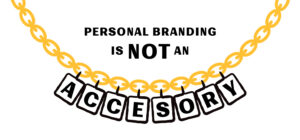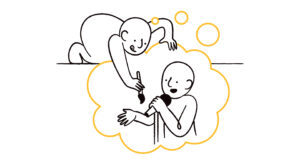Branding
Personal branding is not fame, but sometimes it disguises itself as such.

You don’t have to dance on Instagram or share your traumas in a story with a sunset in the background to have a personal brand. It’s not like we are missing it. But there’s something even more disturbing than that overreaction: believing that building a personal brand is an option, when in reality it’s a responsibility. Not to the algorithm, but to your own reflection.
Personal branding is not a selfie with an inspirational quote. It is the sum of your actions, your omissions, your public mistakes, and your well-placed silences. You don’t have to aspire to be an influencer, but you do have to avoid becoming irrelevant for fear of showing yourself.
And be careful, because invisibility also communicates. Passivity is a type of positioning: one that speaks of disconnection, indecision, an absence that sometimes smacks more of insecurity or fear of trying than humility.
Let’s get back to basics: this is what really matters
Yes, there are lists. And this one has five points. Not because lists are magical, but because, at least for a moment, they make us feel like we have control over the chaos. But what follows are not tips for going viral, nor commandments for sounding interesting in an interview. They are the five pillars that mark the difference between having a brand… and having silent or, worse, schizophrenic profiles: those that comment on everything, all the time, but say absolutely nothing.

1. Clear proposal (not to be confused with “What do you do for a living?”)
“I’m a marketing expert” is like saying “I breathe oxygen.” It’s a fact, not a proposition. Clarity isn’t repeating your LinkedIn job title; it’s being able to answer accurately and without nervousness: What specific problem do you solve? For whom? How does it make you different from others?
And above all, why should anyone pay attention to you?
A brand without focus is not humble. It is confusing. And confusion does not inspire confidence, it just generates more scrolling.
Like Camila, who works in digital marketing and doesn’t repeat the numbing mantra of “change is the only constant” every time Meta launches a new feature that hurts small brands. She tells it like it is: “This isn’t innovation, it’s abuse of a dominant position. And someone has to say it without fear of losing a collaboration.” She doesn’t have a thousand likes, but she has respect. And in this business, that’s capital.
2. Firm values (and not those who give likes)
Values are not pretty words hung on the office reception wall. They are not “empathy,” “resilience,” and “leadership” in cursive font on a photo of a mountain. They are uncomfortable choices, difficult decisions, and sustained behavior even when no one is watching.
Values aren’t found. They’re built. They’re carved out on hard days. In what you do when it’s not convenient for you.
Preaching one thing and practicing another is not only hypocritical, it’s in bad taste. And bad taste, you know, can be spotted a mile away in the digital world… and even more so in the real world.
Like Fernando, a psychologist who talks about mental health without disguising science as self-help. He doesn’t romanticize diagnoses or turn depression into an aesthetic. He speaks with respect and facts. He educates, he doesn’t exploit.

3. Daily consistency (not just a streak of good posts)
Consistency isn’t measured by well-edited posts, but by what you do when there’s no cell phone recording you. You can sound brilliant on a podcast and then ignore your team the next day. You can post about conscious leadership and then punish others’ mistakes with passive-aggressive sarcasm.
Your brand is not what you say. It’s what those around you feel when you walk into a meeting.
The rest is acting. The rest is a campaign that will fall apart sooner or later.
Like Martina, who preaches workplace well-being and practices what she preaches: there are no emails from her after 6 p.m., not even to say “it’s quick.” Because if you’re going to talk about balance, you’d better start by respecting other people’s time.
4. Show up (without putting on a show)
Being visible with discernment does not mean commenting on everything or popping up every two hours with a prefabricated pearl of wisdom. It means appearing when it matters, with an informed, firm, authentic voice. Not with recycled phrases or statistics from consultants who also give their opinion on how to sleep better.
Leadership is not about volume. It is about presence. It is about knowing when to speak… and also when to remain silent so as not to make a fool of yourself.
Like Andrés, director of a healthcare company that faced a reputation crisis after a poorly planned campaign. While others suggested “waiting for the scandal to blow over,” he came out publicly, without a spokesperson or intermediaries, to acknowledge the mistake, explain what had happened, and take responsibility. He didn’t delegate to the community manager. He didn’t blame the algorithm. He faced the music. And in an era where everyone hides behind a press release, that’s worth more than a hundred well-executed campaigns.
5. Communicate meaningfully (even if the algorithm penalizes you)
Here comes the uncomfortable part: meaning cannot be inherited, bought in storytelling courses, or improvised. It is built with clarity of vision and daily discipline. And yes, often the algorithm will not reward it.
But it is better to have something to say than just something to post.
Meaningful content doesn’t seek likes or followers: it seeks emotion, connection, and attention. And that, in times of digital saturation, is almost subversive.
Like Valeria, a makeup influencer who doesn’t do 15-step tutorials on how to “transform” yourself. She teaches you how to care for your skin before covering it up, and how to choose affordable products. She doesn’t accept just any sponsorship: if she wouldn’t put it on her sister’s face, she won’t show it. That’s why she has fewer brand followers… and more people who don’t want to look like anyone else.

It’s not vanity. But be careful: sometimes you wear the same clothes.
Building a personal brand is not narcissism. It is an urgent response in a world where titles sound the same, achievements are confused with perfectly rehearsed poses, and offices are decorated with the same motivational phrases in acrylic: “Do it with passion,” “Be the best version of yourself,” “There are no problems here, there are opportunities.”
(If you read those phrases and thought they sounded reasonable… you may already be in danger of becoming indistinguishable.)
Your reputation is not an accessory. It is the foundation upon which your decisions, relationships, and opportunities are built. And if you don’t work on it, others will do it for you. And when others do it, they almost always do it badly. Or worse: they do it flat out.

You can start today. With intention. With honesty.
No lights, no ring lights, no blurred Zoom background.
Because your personal brand isn’t about visibility.
It’s about direction.
It’s not about talking more.
It’s about stopping hiding.
And yes, personal branding is important.
Because if you don’t take it seriously, the algorithm will do it for you.
It will study you. It will categorize you.
It will put you in a box.
And that box usually says:
“irrelevant” — just another number among the millions of users around you.





